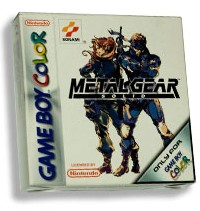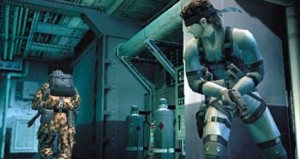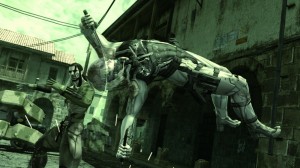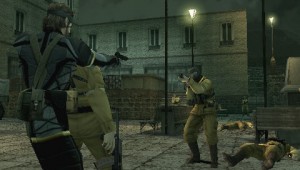Recently I played through Metal Gear Solid(MGS) for the GameBoy Color(GBC), a surprisingly hard to find and often overlooked game in the popular Metal Gear series. As with other games in the series, especially the Playstation version of MGS, it doesn’t let the technical limitations of the hardware hold it back from delivering a surprisingly deep game with a detailed story. The game raises the standards of games on the GBC, not just technically but through it’s enquinety with control and sheer content.

Today I want to share my thoughts on the Metal Gear series, currently I’ve played Metal Gear 1/2, Metal Gear Solid 1/2/3 and Metal Gear Solid on the GBC.
I find that the series contains many aspects that sets it apart from other games, however these aspects make it such a polarising series. The story would have to be the most polarising aspect of the series. Relative to other video game stories, Metal gear presents a more complex, stylised story, be it through the use of modern history, the discussions of the technicalities of war or the layered relationships between major characters.
More complex entertainment demands more from its audience who are trained to accept the lowest common denominator of complexity in entertainment. Clearly anything that steps up the complexity is at risk of alienating a few. However I think the expense of alienating a few in order to raise the standard of entertainment is a perfectly okay sacrifice to make.

Parts of the story become very convoluted with plot twists that layer and intertwine and become so complicated to some that the story comes off as being incoherent. I can understand how people don’t like this. Personally I enjoy the plot twists and there are points where I am at a loss to describe what is going on. However because of my attachment to these games such twists and entanglements encourage me to pay closer attention to the details. This problem is evident in MGS2, while confusing I found the ideas that were presented to be incredibly compelling.
The stories of Metal Gear are layered on thick and arguably too thick with long cut scenes that drown out those who don’t take interest in it. The argument that there is this balance between interaction and no interaction in games confuses me. Video Games are just software, the classification of games can narrow our mindset to what we can do with such software. However thinking just in the steeped definition of games doesn’t do us any good when you have games that push that definition into interesting places.
The game play in Metal Gear focuses of setting up environments in which the player much use her arsenal of stealth items and sometimes lack of, to sneak through without being detected. This open ended style of play allows players to create their own narrative if they take to the games mechanical system. The game offers few in game rewards for experimentation and ultimately the player is self rewarded through the interesting scenarios that can play out. The process of the players rewarding themselves goes against some silly ideas the industry has of baiting players with rewards in order to keep them playing.

As you’ve probably noticed I’m really a fan of this series. I’ve just defended some of the major complaints people have with it. I can understand these views however they don’t bother me so much, sometimes they do quite the opposite. However there are things that bother me about the series and I want to talk about them too.
MGS borrows heavily, as do most games in the series from the well established Metal Gear 2 mechanics. MGS is practically Metal Gear 2 in 3D and MGS on the GBC is just more Metal Gear 2, with the only new mechanics being added were 8 way movement and colored box puzzles. MGS3 and probably MGS4, I’ll find out when I play it, add more to the base mechanics but it barely changes the fundamental mechanics at play. The fundamental mechanics of the Metal Gear games is ‘stealth’ which basically boils down to avoiding enemy viewing boxes. Not really all that interesting. The different scenarios that play out can be interesting but they don’t always remedy this core problem. The major mechanic of a game should be the most fun/interesting/whatever and avoiding hit boxes is not.
Repetitive story structures are another problem that plagues the Metal Gear games. Repetitive villainous groups are in every game, be it Fox Hound, GRU, Dead Cell, etc with each group containing around 5 members that you must destroy through the entirety of the game. This story choice greatly influences the games structure with boss battles set at regular intervals that can make for predictable pacing. This point is rather subjective but it does tire when in every introduction screen you hear about of a rebel group of 5 or so members.

What information is hidden and revealed and to whom great affect the mood of games. One frustration that I have with the Metal Gear games is that once you have alerted an enemy in the game, then all enemies appear to know where you currently are if you are within a certain range(physical distance, not necessarily the enemies viewing distance). There is nothing in the game to indicate that all enemies should know exactly where you are. The enemies use radios to communicate but that doesn’t explain why the realism presented in these games graphical system doesn’t match the realism present in the games mechanical system.
I think that’s about all I have to say on Metal Gear. It’s a great series that I recommend people try, even if it just to see if you’d enjoy it.

